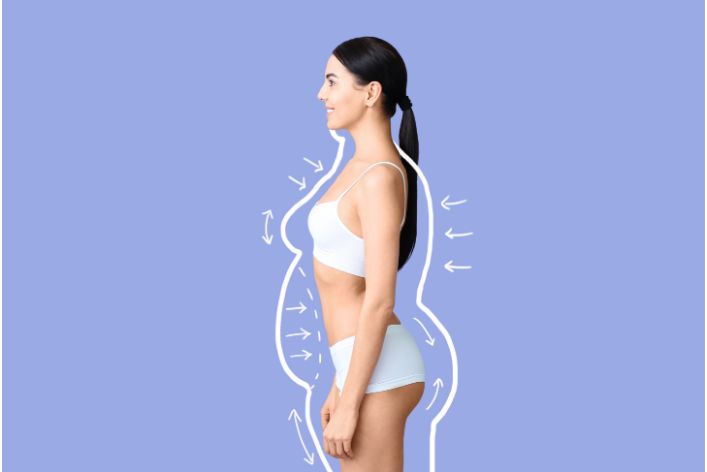Weight loss is a topic that is frequently discussed, advertised, and sought after by millions of people worldwide. However, despite the abundance of information, there are plenty of myths and misconceptions about it. These myths can be misleading and dangerous, leading to unhealthy habits and unrealistic expectations.
The purpose of this blog post is to debunk the most common myths about weight loss and provide factual information that can help people make informed decisions about their health. It is crucial to understand the science of weight loss and dispel the myths that are keeping people from achieving their goals and living a healthier life.

Weight loss is simply a matter of eating less and exercising more, right? Wrong! There is a lot more to it than calorie deficits and sweating it out at the gym. The truth is that weight loss involves complex biological mechanisms that go beyond simple math equations.
The idea that weight loss can be achieved faster by cutting out entire food groups or drastically restricting calories is another common myth that needs to be addressed. Rapid weight loss may seem appealing, but it is often not sustainable and can lead to health problems.
It is also a myth that weight loss supplements and fad diets are the key to success. Despite the convincing advertising, these products are often ineffective, and in some cases, can be dangerous.
Debunking the myths about weight loss is vital to helping people achieve their goals and maintain a healthy lifestyle. Understanding the scientific principles behind weight loss can help people make informed decisions and avoid harmful practices. In the next section, we will explore some of the most common myths and misconceptions about weight loss.
Read: How Your Gut Health Contributes to Weight Loss
Myth 1: You can lose weight fast
Everyone wants to lose weight fast, but is it really healthy? Let’s dispel the myth that rapid weight loss is the way to go for a better body.
Why it is not healthy to lose weight too quickly
- Weight loss that is too rapid puts a lot of stress on the body.
- The body loses muscle mass along with fat, which is not ideal for overall health.
- Quick weight loss often leads to a rebound effect, causing the weight to return (and sometimes more).
Scientific evidence to back up the explanation
Studies show that losing weight slowly and steadily results in better long-term success. One study comparing rapid weight loss to slow and steady weight loss found that those who lost weight gradually were more likely to keep the weight off. Another study showed that rapid weight loss resulted in muscle loss, not fat loss, and the weight came back more easily than with slower weight loss methods.
Healthier approaches to weight loss
- Set realistic weight loss goals of no more than 1-2 pounds per week.
- Focus on building muscle mass through strength training.
- Eat a nutrient-rich, whole foods-based diet that is rich in fruits, vegetables, and lean proteins.
- Avoid fad diets or rapid weight loss schemes that promise quick results.
- Get adequate sleep and manage stress levels to support healthy weight loss efforts.
Overall, losing weight too quickly is not healthy and can have negative effects on the body long-term. Slow and steady weight loss, along with a focus on building muscle mass and a healthy diet, is the best approach for sustained and healthy weight loss. Remember, the key to improving overall health and wellness is to make small, sustainable changes that can be maintained over time.
Read: The Best Fruits for Weight Loss
Myth 2: You should avoid dietary fat
There is a common misconception that people need to avoid dietary fat in order to lose weight. However, this is a myth. Dietary fat is actually an important part of a healthy diet, and depriving your body of it can have negative consequences.
Why dietary fat is important for the body
Dietary fat has several important functions in the body:
- It helps to insulate and protect the body’s organs.
- It is necessary for the absorption of certain vitamins, such as vitamins A, D, E, and K.
- It is an important source of energy.
- It helps to maintain healthy skin and hair.
- It is involved in hormone regulation.
Read: Is it Healthy to Eat Over 4 Eggs a Day?
Healthy Fats vs Unhealthy Fats
Not all fats are created equal. Some fats are healthy and should be included in your diet, while others are unhealthy and should be limited.
- Healthy fats: These are unsaturated fats, which are liquid at room temperature. They can be found in foods such as avocados, nuts, seeds, fish, and vegetable oils. These fats can help to lower cholesterol levels and reduce the risk of heart disease.
- Unhealthy fats: These are saturated and trans fats, which are solid at room temperature. They can be found in foods such as butter, cheese, fatty meats, and fried foods. These fats can increase cholesterol levels and increase the risk of heart disease.
Incorporating healthy fats in a weight loss diet
If you are trying to lose weight, it is still important to incorporate healthy fats into your diet. Here are some ways to do so:
- Add avocados to your salads or smoothies.
- Snack on nuts or nut butter.
- Use olive oil or avocado oil when cooking.
- Eat fatty fish like salmon or tuna a few times per week.
- Choose lean cuts of meat, but if you do eat fatty meat, trim off the visible fat.
- Avoid fried foods and processed snacks that contain unhealthy fats.
While it may seem counterintuitive, dietary fat is an important part of a healthy diet, and should not be avoided in a weight loss plan. Instead, focus on incorporating healthy fats into your diet in moderation to support overall health and wellness.
Read: Dangerous Side Effects of Weight Loss Pills

Myth 3: You can target specific body parts for weight loss
One of the most frustrating things about trying to lose weight is that we all seem to have problem areas. Some of us might carry excess weight in our stomachs, while others struggle with flabby arms or thunder thighs. Unfortunately, many people believe that they can target specific body parts for weight loss.
This is a myth, and here’s why:
- Spot reduction is not possible because fat loss occurs throughout the entire body, not just one specific area.
- When we exercise a specific part of the body, we do not necessarily burn fat in that area. Instead, we burn stored energy from all over the body.
- Body fat is lost in proportion to each individual’s genetic makeup, not as a result of targeted exercise.
There are countless products and exercises that claim to target specific problem areas, but they simply do not work. If you want to lose fat in a particular area, your best bet is to focus on overall body fat reduction.
Read: Can Owning a Pet Improve Your Health and Well-being?
Here are a few exercises and tips to help you get started:
- Cardiovascular exercise, such as running or cycling, is a great way to burn overall body fat.
- Strength training and weightlifting can help build and tone muscle, which can increase overall metabolism and aid in fat loss.
- Diet also plays a crucial role in overall fat loss. Focus on a balanced diet rich in whole foods, lean protein, and healthy fats.
- High-intensity interval training (HIIT) has been shown to be highly effective in burning overall body fat.
- Remember that weight loss takes time and consistency. It’s important to focus on overall health and well-being, rather than just targeting specific problem areas.
Scientific evidence shows that spot reduction is not possible, so it’s important to focus on overall body fat reduction through a combination of aerobic exercise, strength training, and a healthy diet. By implementing these tips and exercises, you can achieve your body fat loss goals and improve overall health and well-being.
Read: The Best Strategies To Lose Weight Fast
Myth 4: Carbs are bad for weight loss
When it comes to weight loss, many people believe that cutting out carbohydrates is the way to go. However, this is far from the truth. Carbohydrates play an essential role in our bodies and eliminating them completely from our diets can have negative effects. In this chapter, we’ll debunk the myth that carbs are bad for weight loss and explain why they are important for our overall health.
Why carbohydrates are important for the body
Carbohydrates are one of the three macronutrients that provide energy to our bodies. They are our primary source of fuel and are essential for proper brain and muscle function. Carbs also help with digestion and regulate bowel movements. When we eliminate carbs from our diets, we may experience fatigue, headaches, and difficulty concentrating. This is because our bodies are not receiving the necessary nutrients it needs to function properly.
The difference between simple and complex carbs
Not all carbs are created equal. There are two main types of carbs: simple and complex. Simple carbs are made up of one or two sugar molecules and are quickly absorbed by the body. They provide a quick burst of energy, but can also cause a rapid increase in blood sugar levels and lead to a crash later on. Examples of simple carbs include candy, soda, and white bread.
Complex carbs are made up of long chains of sugar molecules and take longer to be absorbed by the body. They provide sustained energy and help regulate blood sugar levels. Examples of complex carbs include whole grains, fruits, vegetables, and legumes.
Incorporating healthy carbs in a weight loss diet
Eliminating carbs completely from your diet is not necessary for weight loss. However, it’s important to choose healthy, complex carbs that provide nutrients and fiber. Here are some ways to incorporate healthy carbs into a weight-loss diet:
- Choose whole-grain bread, pasta, and rice instead of their white counterparts.
- Eat a variety of fruits and vegetables, which are high in fiber and essential vitamins and minerals.
- Incorporate beans and legumes, such as lentils and chickpeas, into your meals for a protein and fiber boost.
- Limit your intake of sugary drinks and processed foods that are high in simple carbs.
Carbs should not be demonized as a cause of weight gain. Cutting out carbs from your diet can have negative effects on your health and energy levels. Instead, focus on incorporating healthy, complex carbs into your meals for sustained energy and overall well-being.
Read: How to Choose the Right Workout for Your Lifestyle

Myth 5: You need to work out for hours every day to lose weight
Many people believe that they need to work out for hours every day to lose weight. This is one of the most common myths about weight loss, and it is simply not true. In this article, we will explain why this belief is not true, provide scientific evidence to back up the explanation, and suggest effective workout routines that can help with weight loss.
Why the belief that you need to work out for hours every day to lose weight is not true
- Working out for hours every day can cause injury
- Overtraining can lead to fatigue and burnout
- In fact, rest is an important part of any workout routine
- Weight loss is not just about exercise; diet plays a significant role as well
Many people believe that they need to work out for hours every day to lose weight. This belief is not true because working out for extended periods can cause injury, lead to fatigue and burnout, and neglect the importance of rest. Additionally, weight loss is not just about exercise; your diet plays a significant role as well. Therefore, you do not need to spend hours every day in the gym to lose weight.
Scientific evidence to back up the explanation
- According to a study by the Journal of Strength and Conditioning Research, working out for longer than 90 minutes can cause decreased performance and increased risk of injury
- Research from the American Council on Exercise suggests that overtraining can lead to fatigue, burnout, and decreased motivation to exercise
- A study conducted by the University of Milan found that resistance training one to two days per week, combined with proper nutrition, was effective for weight loss and overall health improvement
The scientific evidence is clear: working out for hours every day is not necessary for weight loss. In fact, it can be counterproductive and increase your risk of injury and burnout. According to studies, resistance training one to two days per week, combined with proper nutrition, is effective for weight loss and overall health improvement.
Effective workout routines for weight loss
- High-intensity interval training (HIIT)
- Strength training (e.g., lifting weights)
- Cardiovascular exercises (e.g., running, swimming, biking)
While you don’t need to work out for hours every day to lose weight, you do need to engage in physical activity to create a calorie deficit. Here are some effective workout routines for weight loss:
- High-intensity interval training (HIIT) involves short bursts of intense activity followed by brief periods of rest. HIIT has been shown to be more effective for weight loss than traditional cardio workouts.
- Strength training is an essential part of any weight loss routine. Building muscle helps increase your metabolism and burn more calories, even at rest. Lifting weights or doing bodyweight exercises are great options.
- Cardiovascular exercises such as running, swimming, or biking help burn calories and improve heart health. Aim for at least 30 minutes of cardio exercise per day.
The myth that you need to work out for hours every day to lose weight is simply not true. Engaging in physical activity is essential for weight loss, but it does not need to be excessive or extreme. By incorporating effective workout routines and proper nutrition, you can achieve your weight loss goals in a safe and healthy way.
We Design & Develop Websites, Android & iOS Apps
Looking to transform your digital presence? We specialize in creating stunning websites and powerful mobile apps for Android and iOS. Let us bring your vision to life with innovative, tailored solutions!
Get Started TodayRead: How to Create a Balanced and Nutritious Meal Plan
Conclusion
Weight loss is not as simple as “calories in, calories out.” Myths such as the idea that weight loss is solely about willpower ignore the complex biology and environmental factors at play. It’s important to create sustainable lifestyle changes, focusing on nutrient-dense whole foods and consistent physical activity.
Crash diets and extreme exercise regimes are not sustainable in the long term and may be detrimental to one’s overall health. It’s also important to seek professional help if needed, as weight loss is not a one-size-fits-all solution.
For further reading, we recommend checking out the American Council on Exercise or consulting a registered dietitian. Remember, the goal should not be to fit into a certain size or societal expectation, but to prioritize our health and well-being by adopting healthy habits.
Read: Unleash Tea’s Healing Magic: Transform Health with Potent Brews
Before You Go…
Hey, thank you for reading this blog to the end. I hope it was helpful. Let me tell you a little bit about Nicholas Idoko Technologies. We help businesses and companies build an online presence by developing web, mobile, desktop, and blockchain applications.
We also help aspiring software developers and programmers learn the skills they need to have a successful career. Take your first step to becoming a programming boss by joining our Learn To Code academy today!
Be sure to contact us if you need more information or have any questions! We are readily available.
Put Your Tech Company on the Map!
Get featured on Nicholas Idoko’s Blog for just $200. Showcase your business, boost credibility, and reach a growing audience eager for tech solutions.
Publish Now










